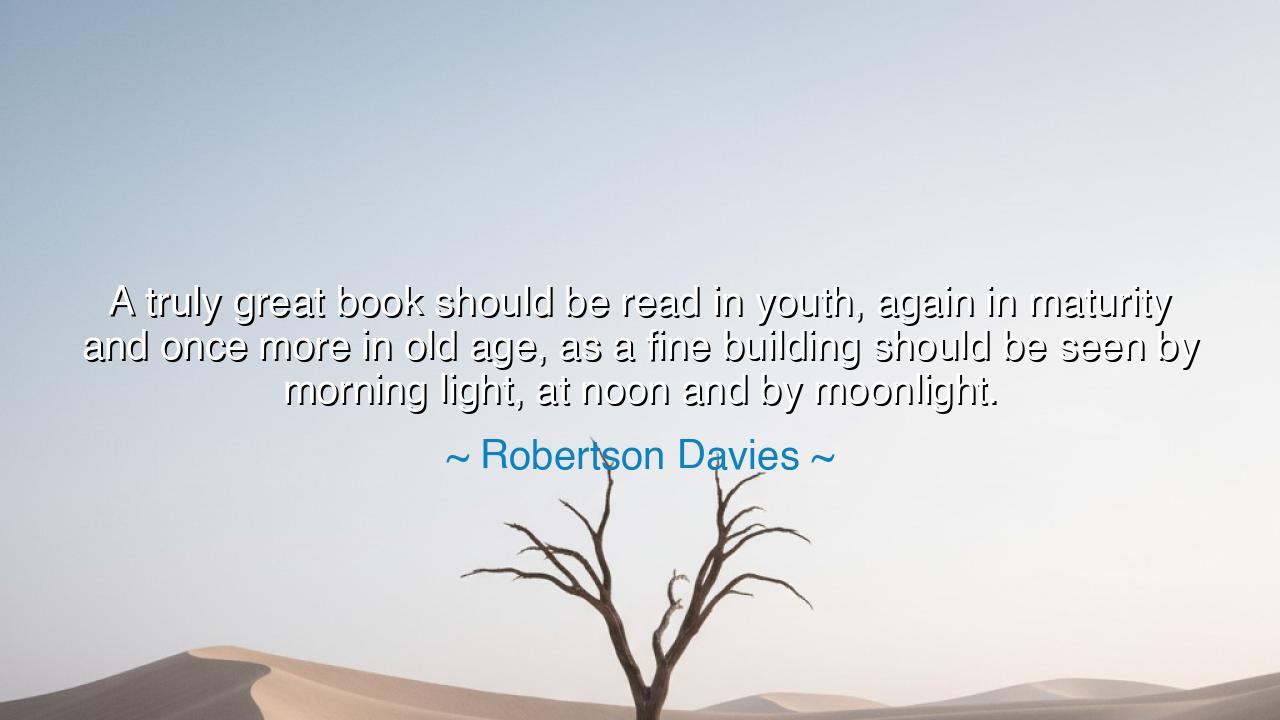
A truly great book should be read in youth, again in maturity and
A truly great book should be read in youth, again in maturity and once more in old age, as a fine building should be seen by morning light, at noon and by moonlight.






Harken, O children of the future, to the words of Robertson Davies, a sage whose reflection on the nature of great books carries with it the wisdom of the ages: "A truly great book should be read in youth, again in maturity, and once more in old age, as a fine building should be seen by morning light, at noon, and by moonlight." These words, though simple, open before us a profound truth about the nature of wisdom, growth, and the ever-evolving perspective of the human soul. A great book, like a building of ancient design, is not merely a thing to be seen once and forgotten. No, it is something that transforms with the passage of time, just as we do—each phase of life revealing new dimensions, new layers of meaning, new understanding.
In the ancient world, the philosophers often spoke of knowledge as something not just to be acquired, but something to be lived—a truth that deepens over time. Consider the words of Plato, who believed that true wisdom comes not in the accumulation of facts, but in the reflection upon those facts over the course of one’s life. Just as Plato’s Allegory of the Cave teaches us that our understanding of the world is limited by our experience, so too does the experience of reading a great book change with the stages of life. A young mind sees one thing, a mature mind sees another, and an old mind, having lived and loved and suffered, sees yet another. Each reading, each interpretation, is a reflection of where you stand in life, what you have become, and what the book itself offers to you.
Think of the Iliad and the Odyssey, those great epics of ancient Greece. A young person may read them with the eyes of adventure, swept away by the heroic deeds of Achilles and Odysseus, perhaps seeing in them the glory of battle and the allure of the heroic journey. Yet, when read in maturity, the reader may begin to see not just the glory, but the cost of those victories—the hubris, the loss, and the tragic consequences of pride. In old age, a deeper understanding might emerge: the search for home and the longing for peace that pervade both epics become more poignant, the stories less about the deeds of war and more about the sacrifices and longings of the human soul. The journey of reading these books parallels the journey of life itself: we see with different eyes depending on where we stand.
In the same way, consider the Divine Comedy of Dante Alighieri. When a young person reads Dante’s journey through Hell, Purgatory, and Paradise, they may focus on the grand spectacle of his travels, the vivid imagery, and the moral lessons of sin and virtue. In maturity, they may see in Dante’s journey the weight of human choices, the consequences of actions taken and paths chosen. And in old age, a reader may understand more fully Dante’s quest for salvation not just for himself, but for all of humanity—a yearning for peace, understanding, and transcendence. The same text is not merely read but lived in each phase of life, offering new truths and a deepening connection to the self and the universe.
Thus, Davies’ wisdom calls us to return to the great books that have shaped human thought and to revisit them with the fullness of experience, knowing that each time we do so, we uncover something more. For what we see in the morning light of youth is different from what we see in the noon of maturity, and still different from what we see in the moonlight of old age. A truly great book, much like a masterpiece of architecture, reveals itself differently depending on the light—and the light that comes with age, wisdom, and reflection is the truest light of all.
In your own lives, O children, let this lesson guide you: do not seek to read only for the sake of knowledge or entertainment. Approach the great works of the world with the understanding that they will grow with you, that they will speak to you at different moments of your life in different ways. As you grow older, let your books be your companions, the mirrors that reflect not only the world around you but the person you have become. Return to the classics, to those works that have stood the test of time, knowing that each time you return to them, they will offer you more.
So, take this advice into your hearts: choose wisely the books you read, for they will grow with you. Read them in your youth, when your spirit is hungry for adventure, read them in your maturity, when your soul seeks understanding, and read them in your old age, when your heart craves wisdom. In this way, you will live not just the life of one person, but the life of many, each new reading bringing you closer to the truth that lies at the heart of every great story.






AAdministratorAdministrator
Welcome, honored guests. Please leave a comment, we will respond soon